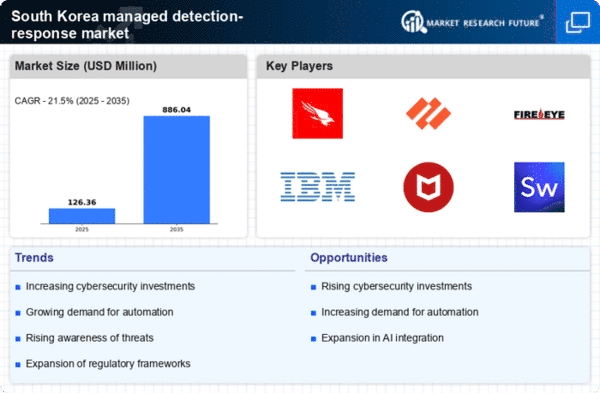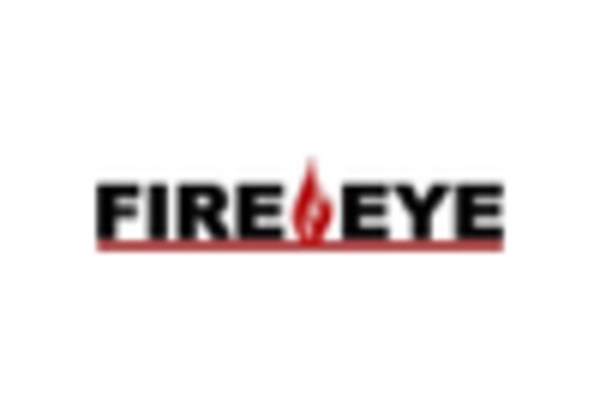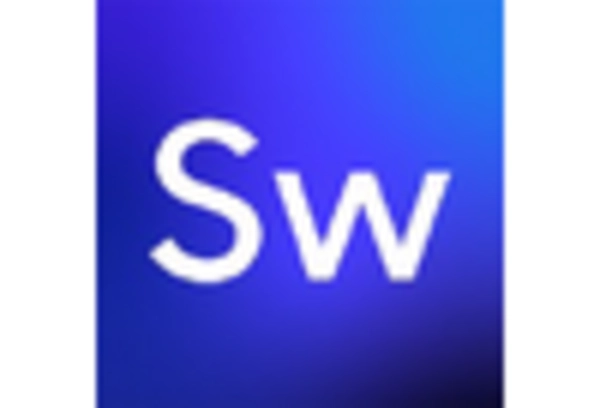Increased Regulatory Scrutiny
The managed detection-response market is influenced by increased regulatory scrutiny in South Korea. Regulatory bodies are intensifying their focus on cybersecurity practices, compelling organizations to adopt comprehensive security measures. The Financial Services Commission (FSC) has introduced guidelines that require financial institutions to implement robust cybersecurity frameworks. This regulatory environment is fostering a greater reliance on managed detection-response services, as they offer the expertise and resources necessary to meet compliance requirements. As organizations strive to align with regulatory expectations, the managed detection-response market is expected to experience significant growth.
Rising Cyber Threat Landscape
The managed detection-response market is experiencing growth due to the escalating cyber threat landscape in South Korea. With a notable increase in cyberattacks, organizations are compelled to adopt advanced security measures. Reports indicate that cybercrime costs in South Korea could reach approximately $16 billion annually, prompting businesses to invest in managed detection-response services. This market segment offers real-time monitoring and rapid incident response, which are crucial for mitigating risks associated with data breaches and ransomware attacks. As threats evolve, the demand for sophisticated detection and response capabilities is likely to rise, driving the managed detection-response market forward.
Growing Awareness of Data Privacy
In South Korea, the managed detection-response market is benefiting from heightened awareness regarding data privacy. With the implementation of stringent data protection regulations, organizations are increasingly prioritizing the safeguarding of sensitive information. The Personal Information Protection Act (PIPA) mandates strict compliance, leading to a surge in demand for managed detection-response services that ensure adherence to these regulations. Companies are recognizing that failure to comply can result in substantial fines and reputational damage. Consequently, the managed detection-response market is positioned to grow as businesses seek solutions that not only protect data but also facilitate compliance with evolving legal frameworks.
Demand for 24/7 Security Monitoring
The managed detection-response market is driven by the growing demand for 24/7 security monitoring in South Korea. Organizations are increasingly recognizing that cyber threats can occur at any time, necessitating continuous vigilance. The need for round-the-clock monitoring services is underscored by the fact that many cyber incidents occur outside of regular business hours. Managed detection-response services provide the necessary infrastructure to ensure constant surveillance and rapid response to potential threats. This demand for uninterrupted security monitoring is likely to propel the managed detection-response market, as businesses seek to enhance their security posture and minimize risks.
Shift Towards Cloud-Based Solutions
The managed detection-response market is witnessing a shift towards cloud-based security solutions in South Korea. As organizations migrate to cloud environments, the need for robust security measures becomes paramount. Cloud adoption is projected to grow at a CAGR of 20% in the coming years, which may drive the demand for managed detection-response services tailored for cloud infrastructures. These services provide scalable and flexible security options, enabling businesses to respond swiftly to threats. The integration of cloud technologies with managed detection-response capabilities is likely to enhance overall security posture, making it a key driver for market expansion.
















